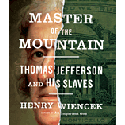Review Details
Master of the Mountain
Product Rating: Product Review (submitted on January 8, 2013):In 2003, historian Henry Wiencek tackled the difficult subject of America's Founding Fathers and slavery with his excellent and penetrating An Imperfect God: George Washington, His Slaves, and the Creation of America. In 2012, he revisited the topic to take on a Founder who comes out much worse for the contest in Thomas Jefferson in Master of the Mountain: Thomas Jefferson and His Slaves. Wiencek delivers another fascinating look at a troubling part of the American past in examining how the author of the Declaration of Independence justified owning slaves.
While George Washington went from typical Virginia planter to commanding African-American soldiers in the Revolution and freeing his slaves in his will after many attempts to do so in his lifetime, Thomas Jefferson, unfortunately, takes the opposite arc. Wiencek describes how Jefferson changed from a young idealist who had included emancipatory language in the original drafts of the Declaration of Independence to a man who wrote how glowingly about how profitable holding slaves was, deflected any suggestion he push for emancipation in Virginia or emancipate his own slaves, and probably had a relationship with a woman he owned.
Wiencek very carefully follows Jefferson's documented views on slavery over his life, untangled the most obfuscating of Jefferson doublespeak with penetrating analysis and a reliance on the facts. For every Jefferson letter where he speaks about slavery being an unprofitable and heavy burden, he finds an entry in Jefferson's business papers showing how profitable the slaves were in fact. For every claim slaves were unable to take care of themselves or learn complex tasks, Wiencek finds examples of distinguished slave artisans at Monticello and the success of slaves who had run away from Monticello or been freed by other nearby slaveholders. Jefferson had no problems living in one world and pretending it was another, and Wiencek thoroughly tears down the facade.
In addition to a large focus on documentary evidence on Jefferson's views and how he ran Monticello, Wiencek also looks at the archaeological evidence of how Jefferson's plantation worked. He includes descriptions of what he learned from the scholars working on the mountain, and it provides an interesting perspective that adds to the written trail.
No discussion of Jefferson and slavery would be complete without addressing Sally Hemings, of course. Wiencek addresses this major issue evenhandedly and with looking at all available scientific and documentary evidence and concludes that Thomas Jefferson probably was the father of Hemings' children. Wiencek also uses the examples of the Hemings family to explore Jefferson's relationship to his slaves that weren't of this favored family.
I listened to HighBridge Audio's 2012 production of the book, narrated by Brian Holsopple. The production was very well done, with Holsopple providing a neutral, almost conversational voice to Wiencek's words. Holsopple also made it very clear when he was quoting a historical document or person through his vocal framing, which I've found can be a problem with some other non-fiction narrators. The unabridged production runs approximately 11 hours.
I highly recommend Wiencek's Master of the Mountain to anyone interested in Jefferson, slavery, or early American history. It doesn't have the same positive arc that Washington's story does, but that's Jefferson's fault, not Wiencek's, and since there were many more plantation owners like Jefferson than Washington, it's all the more relevant.
Note: I received a complimentary review copy of this audiobook from the publisher.

